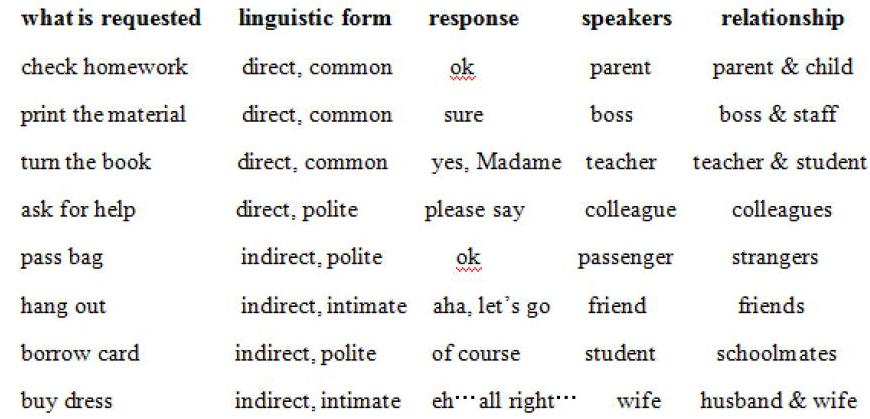A Study of Chinese Request Speech Acts
2019-12-23万原林

Pragmatics is an important branch and research field of linguistics. After the famous linguist J. L. Austin introduced the Speech Act Theory in 1955, John Searle, Austins student, linked the illocutionary act with the discourse content. He gave a clear description of the locutionary act and illocutionary act. The core problem of this study is how do people meet the needs of expressing “request others to perform something” by using language form. The origin of the word “request” was the ancient French word “requeste”. The definition of request is a behavior that expresses the need or desire or requires (someone) to do something. Therefore, the speakers often adopt some strategies to adjust the use of various forms of courtesy to make requests polite and easy for listeners to accept, so as to achieve the purpose.
According to Brown and Levinson in 1987, request will be affected by three factors: the strength or weakness of power, the relationship between speakers and the degree of requirements. When people talk to other people, especially when it comes to making requests, either directly or indirectly, the politeness principle must be considered according to their own culture. The examples I conduct from my experience are as followings: ①Help me check my homework. ②Go and print the material. ③Turn the book over to page 151. ④Xiao Zhang, Id like to ask you a favor. ⑤Could you pass me my bag, please? ⑥Hi! Brother, what are you doing now? ⑦I forgot to bring the meal card, have you eaten yet? ⑧Honey, I see Xiao Li bought a new dress. I tried it and like it very much.
There are many ways to express a “request”. The Chinese request strategy is divided into direct request strategy and indirect request strategy:
1. The direct request strategy: the speaker makes the request in a clear word directly to the person to be asked. With short and clear words directly indicate the purpose of the speaker, ask the other person to do something. From the examples above, we could classify that sentence 1, 2, 3, 4 are in this type. In the relation of parent & child; boss & staff; teacher & student, there is always a more powerful role, such as parent, boss and teacher to a less powerful role: child, staff, and student.
2. The indirect request strategy: contrary to the direct strategy, it is more likely to use inquiry, consultation, a more circuitous and gentle way to make a request. Words often appear in certain words and in interrogative sentences, such as “Excuse me…, Can/ could you..., May I…” It is relatively long compared to the direct one. From the examples above, we could classify that sentence 5, 6, 7, 8 are in this type.
Generally speaking, the listener who is farther away from the society is more inclined to choose the indirect way, and the person who is higher than himself tends to choose the more indirect way. As the examples show above, the relationship between speakers in sentence 5 is strangers, in which the two speakers social relation is far. The social factors that affect the request strategy generally include the social distance, the social status, the age of both parties, gender and so on. Parents to the children, elders to the younger generation, teachers to the students, the superior to the subordinate, they use direct words to send a request. The direct strategy is often used when applying the request to the person who has the same collective relationship with himself, like example 4. In the face of familiar people, we often choose to use the “name, pass the book to me” such direct request, and in the face of strangers, we often use the “please help me to pass the book” or “Could you pass the book to me?” in a polite way. In real life, people will often choose the appropriate language according to the specific context.
【作者簡介】万原林(1995-),女,汉族,陕西西安人,西北大学外国语学院,文学硕士,研究方向:外国语言学与教学。
